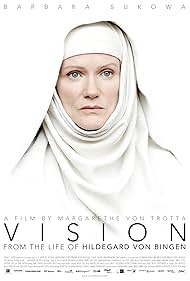Sometimes I muse: what if I woke up and found myself in the middle of the 12th century in Western Europe? What was life really like? The present film centering on one of the most "uppity" women of the Middle Ages, Hildegard von Bingen, takes you into the medieval world as few films do. As much as we often like to idealize the Middle Ages, particularly since the 19th century, the period was anything but ideal. Unlike today, people had few rights, and the powers-that-be could uplift or destroy almost at a whim. In the church, people with power used threats of persecution, usually in the name of heresy or blasphemy, which could result in excommunication and even execution as a means to reign people into modes of behavior which fit their desires and designs. Hildegard von Bingen was one of the few people who stood up to these forces and refused to bow to unreasonable demands easily.
Hildegard was remarkable because she was a woman who challenged predominantly male authority during an age when women wielded very little political influence outside of noble circles. Some queens did have some authority in political realms, but an abbess of a monastery making requests and even demands of bishops and other nobles was almost unheard of. An abbess had authority within her cloister but rarely outside. Typically abbesses were expected to be completely obedient to the local abbot and bishop, following their orders without question on bended knee. But Hildegard was not afraid to vocalize her desires and even her frustrations in front of very powerful forces. She is famous for having visions and claiming communication with God, an assertion which infuriates the local church leaders, who contest that such claims are an insult to the prophets of scripture. Why should God single her out and give her insight not given to bona fide holy people of the Bible? However, she wins favor with one of the bishops who allows her dialogs to be transcribed. Another aspect of Vision, like Name of the Rose, concerns the beautiful medieval books.
The 12th century was markedly different from modern society today but I think there were aspects more similar than we like to acknowledge. If we take a peak behind the curtain of castles and cathedrals, we see the same human desires and weaknesses we all share, which I think is one of the points of Vision. A large part of the film involves Hildegard's attachment to a young novice nun, Richardis, and the relationship becomes closer than even one of mother and daughter. Unfortunately, political and ecclesiastical power threatens the relationship, and not even Hildegard has enough influence to stop it.
The present film is a wonderful tribute to one of the most remarkable figures of the Middle Ages. Barbara Sukowa offers a tour-de-force performance as the medieval abbess who defied convention during an age when non-conventional voices were often silenced, and sometimes violently. The scenes appear to have been shot in real medieval churches and castles which brings the viewer into the 12th century in a way very uncommon in most cinema which depicts these times. Although the 12th century is now 800 to 900 years away, the atmosphere is strangely familiar. Although details about everyday life would probably be unbearable for most of us in the modern age, such as the darkened candle-lit rooms and the constant threat of illness, many desires and fears which permeated life then are not unlike today. High-ranking officials often sought power while there were others who simply wanted to love and be loved and find the best means possible to bring this into being. People in the Middle Ages were still human beings.















